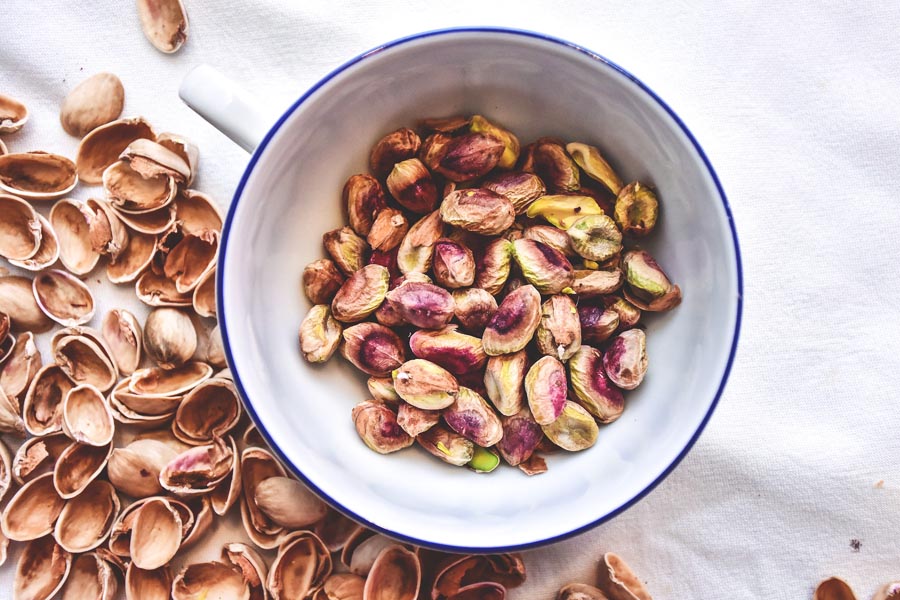Created on Monday, July 08, 2013 12:42 pm
Pistachios are healthier than thought. New research shows that not all the fat present in the nuts is absorbed by the body, so the nuts contain fewer calories than previously thought.
According to researchers, pistachios are a healthy snack for people trying to lose weight and are rich in nutrients and minerals.
The study was conducted by Agricultural Research Service (ARS) of the United States Department of Agriculture (USDA).
The findings indicate that pistachios actually contain fewer calories per serving than previously always assumed. For example, the results show that pistachios contain the least amount of calories of all nut types at 160 calories per 30-gram serving.
According to researchers at the University of California -Los Angeles, it is better to eat pistachios as a snack than saltines. Not only are you maintaining your body mass index (BMI), but you are also supporting heart health.
Behavioral expert James Painter reveals that the pistachio nut-also known as Skinny Nut-is among the conscious snacks. Because you have to peel the pistachios first, it takes longer to eat them. In addition, you can tell exactly how many you have already eaten by the remaining caps.
Cholesterol lowering
Pistachios also appear to be good for cholesterol. Researchers at Pennsylvania State University found that pistachios are packed with antioxidants.
Antioxidants protect cells from free radical damage. And pistachios were found to have a cholesterol-lowering effect. The scientists examined the effect of pistachios on blood antioxidant levels. They had study participants follow three different diets, each for a month.
The first diet was an ordinary cholesterol-lowering diet without nuts. The other two diets were similar diets to which 42 or 78 grams of pistachios were added.
Good for intestinal flora
A preliminary study of 16 people suggests that eating pistachios may alter the levels of potentially beneficial bacteria in the gut. This discovery promises good support for healthy digestion. The research, is the first study on pistachios and almonds and their modulating role on gut flora composition.
“Gut microbiota, or the microbial environment in the gastrointestinal tract, provides important functions for the human host, ” said Volker Mai, PhD, lead author of the study and assistant professor at the University of Florida’s Institute of Food and Agricultural Sciences. “Altering microbiota to a ‘beneficial’ composition is a promising approach for supporting gut health, with potential effects on overall health, and it appears that pistachios may play a role in this process.”
Pistachios seem to have prebiotic properties, these contain non-digestible components such as dietary fiber, which occur in the gut and serve as food for naturally occurring bacteria. They also contain phytochemicals that have the potential to alter microbiota composition. Foods with prebiotic properties enhance the growth of beneficial bacteria in the digestive tract.
To investigate this relationship between prebiotics in pistachios and the gut, researchers conducted a nutrition study at the Beltsville Human Nutrition Research Center in Maryland. Sixteen healthy subjects were randomly assigned a predetermined American diet. This diet contained either 0 grams, 1.5 grams or 3 grams of pistachios or almonds per day. Each participant’s calories per diet were closely monitored to ensure that they did not lose weight or gain weight during the study.
Multiple stool samples were collected during the study and analyzed for bacterial composition. The researchers also determined amounts of lactic acid bacteria and bifidobacteria (two groups of live microorganisms that reside in the digestive tract and help break down foods) the stool contained.
After controlling for age, dietary factors and other relevant variables, the researchers found that after 19 days, in those who ate up to 3 grams of pistachios (about 147 nuts or 2 servings) per day, a change in the levels of various gut bacteria had occurred.
According to the results, people who ate pistachios showed an increase in potentially beneficial butyrate-producing bacteria. Butyrate appears to be a preferred source of energy for colon epithelial cells, which are thought to play an important role in human health. The difference in gut microbes was stronger in people who ate pistachios than in those who ate almonds. The researchers used “modern high-throughput sequencing “to quantify specific gut bacterial DNA signatures before and after nut consumption. According to the researchers, this method establishes that pistachios and almonds have the ability to help change the amount of bacteria in the gut.
“Fiber and incompletely digested foods, including nuts, are necessary for maintaining diverse microbiota, “says Mai.” Although still in the early stages of research, this study provides a promising signal that increasing the consumption of nuts, specifically pistachios, offers new opportunities for modifying the number of ‘healthy’ microbiota present in the gut, with potential health benefits. “

